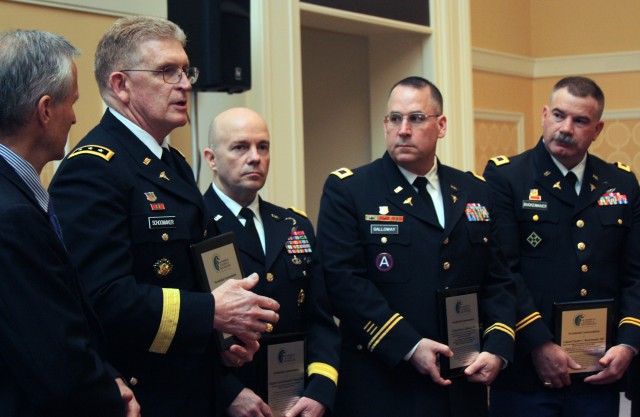WASHINGTON (Army News Service, March 29, 2011) Aca,!" The Army surgeon general and three other Medical Department officers were honored with awards March 26 during the 27th annual meeting of the American Academy of Pain Medicine.
The academyAca,!a,,cs Presidential Commendations were presented for efforts toward improving comprehensive pain management in the Army -- efforts that have ranged from better use of anesthesia to non-pharmacological treatments such as acupuncture, chiropractic therapy, yoga and biofeedback.
More than 900 scientists and physicians attended the five-day AAPM conference at National Harbor, Md., to focus on the most up-to-date advances in pain research, evidence-based treatments, and clinical breakthroughs.
The honorees included Lt. Gen. Eric B. Schoomaker, commanding general of the U.S. Army Medical Command and the surgeon general; Brig. Gen. Richard W. Thomas, assistant surgeon general for force protection; Col. Kevin Galloway, chief of staff for the Army's Pain Management Task Force; and Col. Chester C. Buckenmaier, chief, Army Regional Anesthesia & Pain Management Initiative, Walter Reed Army Medical Center.
Aca,!A"This visionary team has actually looked at the problem of pain in our injured Soldiers from the moment of injury and then taking it back to getting them back into their communitiesAca,!A| they have dedicated themselves to good pain care as well as thorough research,Aca,!A? said Rollin M. Gallagher, editor, Pain Medicine Journal, AAPM.
According to its charter, The Army Pain Management Task Force was established in August 2009 to make recommendations for a MEDCOM comprehensive pain management strategy to approach pain management holistically. The task forceAca,!a,,cs multidisciplinary and multimodal approach aimed to provide optimal and effective care of pain, while ensuring the quality of life and education of Soldiers and other patients with acute and chronic pain.
Aca,!A"This is a very holistic approach, that was needed to break down styles and boundaries across all of the services,Aca,!A? both military and veteran health services and systems, said Schoomaker.
Aca,!A"The effort we have undertaken is really dedicated to patientsAca,!A|The Soldiers, Sailors, Airmen and Marines on the battlefield who have always unfortunately served as a lesson for improvements in health and healthcare in all wars from the beginning of time,Aca,!A? stressed the surgeon general.
With a level of a standardization and education of pain management across the Department of Defense and Veterans Health Administration, the goal of the task force is to improve and optimize care for servicemembers and their beneficiaries.
The surgeon general spoke briefly after the four team members received their awards. He stressed that this is a team effort, with the expertise and support of a variety of military, Veterans Affairs and civilian medical experts nationally and internationally.
Aca,!A"If weAca,!a,,cre going to be successful in these ventures, we are teamed with all of you that are sitting here,Aca,!A? Schoomaker said, Aca,!A"We are your military, we are here to take care of your sons and daughters, brothers and sisters, children and grandchildren, but we can only do this with the support you offer.
Related Links:
Defense & Veterans Pain Management Initiative (DVPMI)
Aggressive treatment of pain prevents future complications




Social Sharing